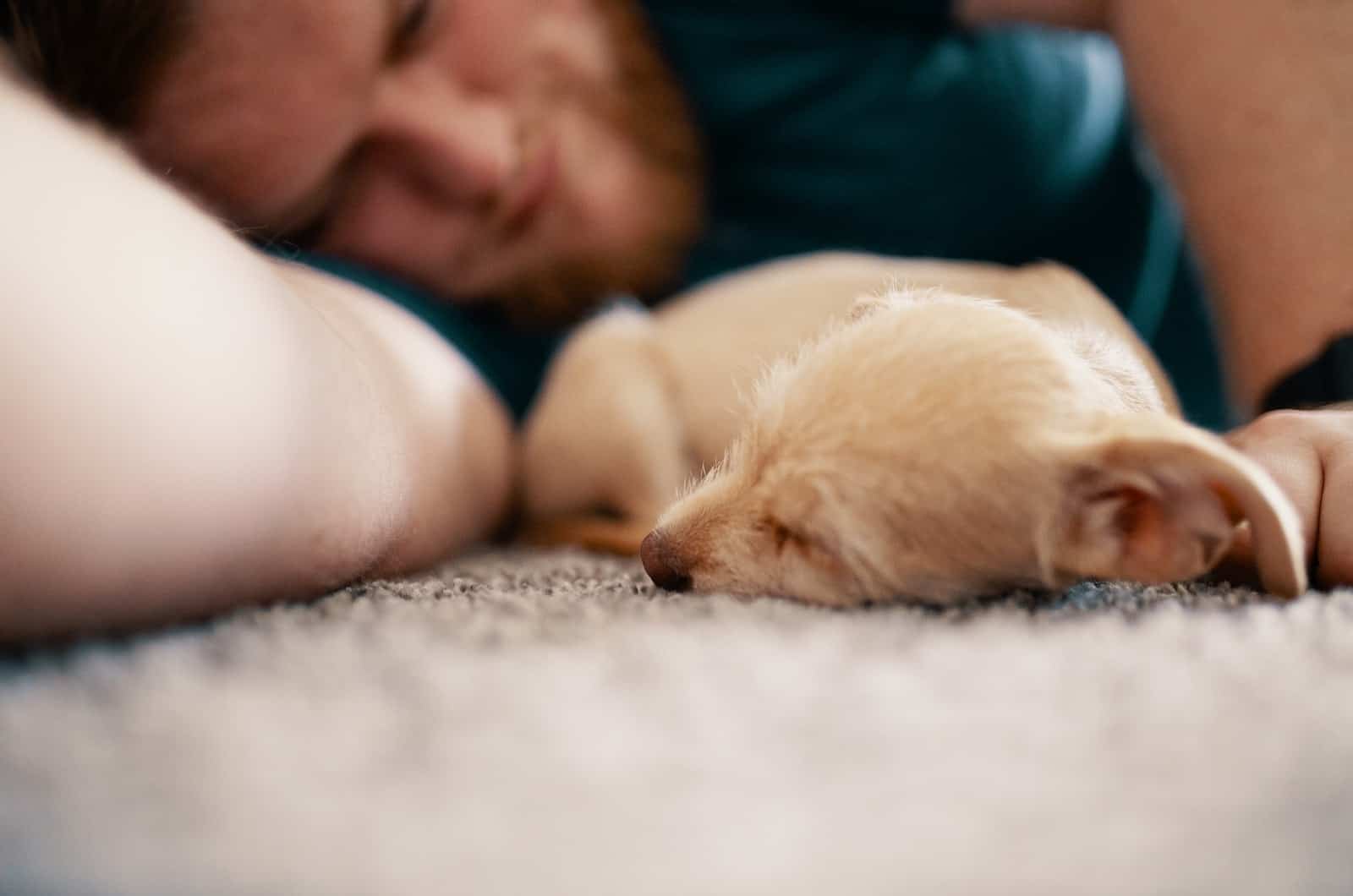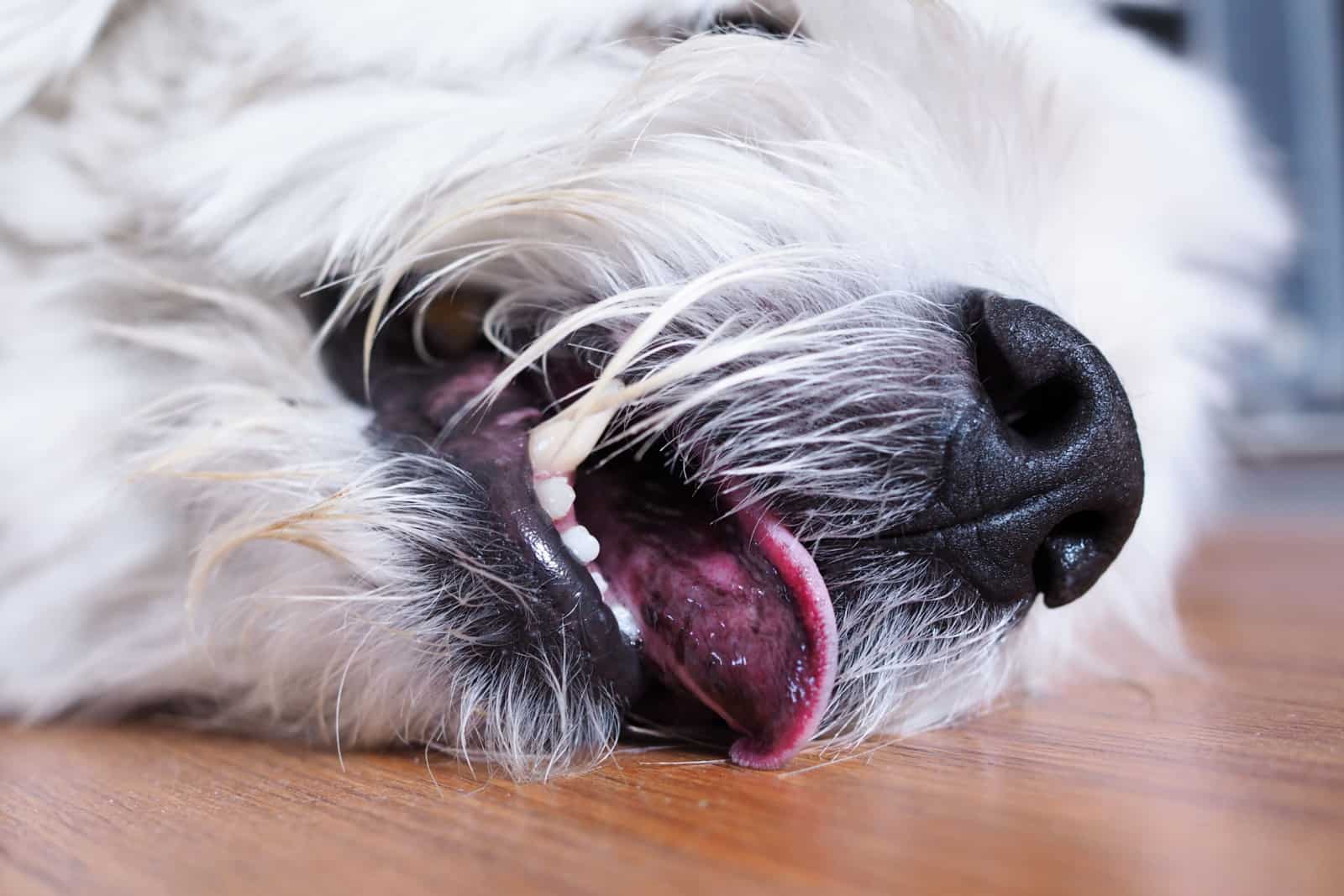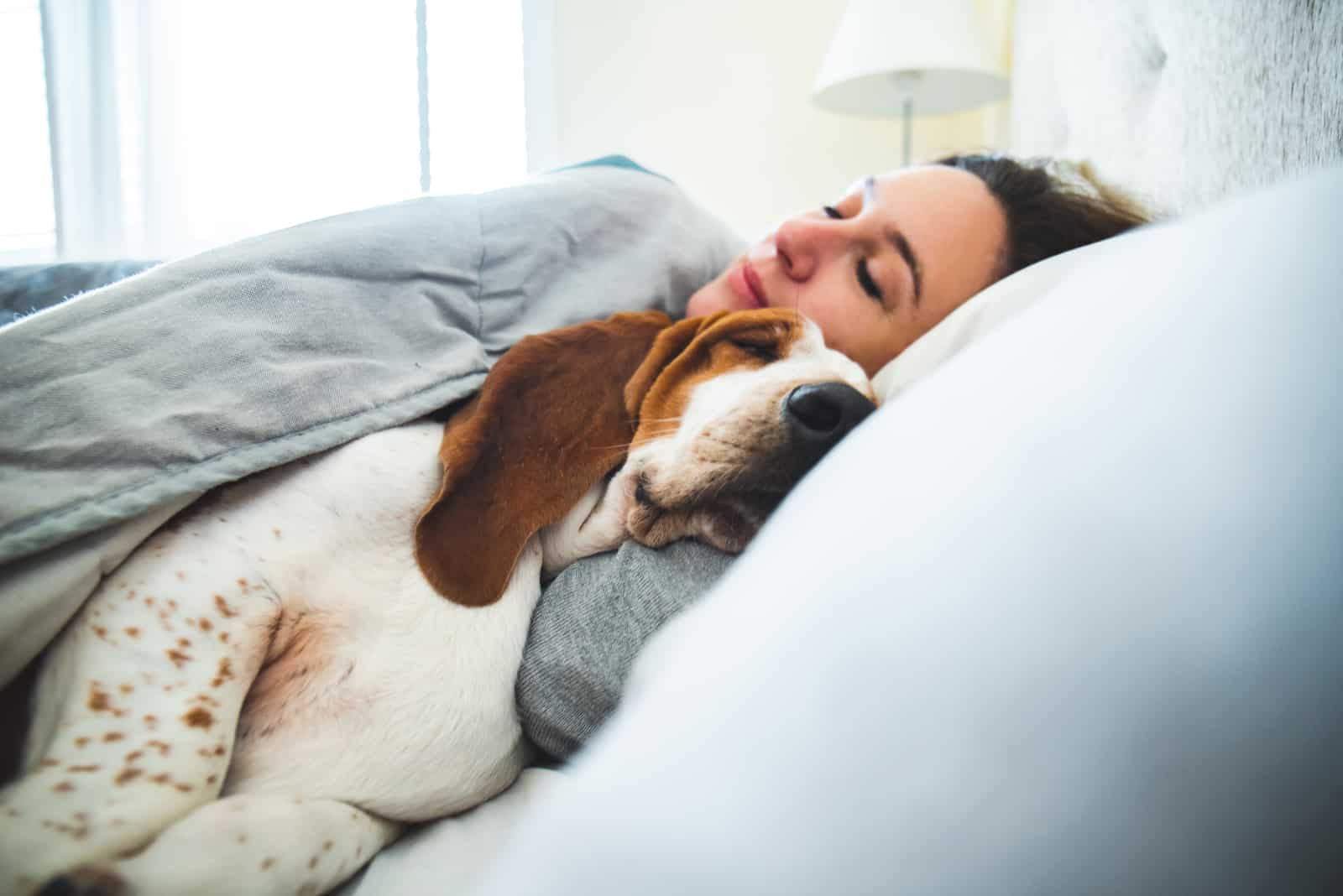
Hành vi của những người bạn đồng hành chó của chúng ta đôi khi có thể hơi bối rối, điều này có thể khiến chúng ta lo lắng. Một trong những hành động như vậy là của bạn khóc trong giấc ngủ, nhưng tại sao nó lại làm điều đó?
Vâng, có rất nhiều lý do. Một số nhẹ và vô hại, trong khi những người khác là dấu hiệu của một vấn đề sâu sắc hơn và có khả năng nguy hiểm.
Một ví dụ về trước đây là một cơn ác mộng mà anh ta có thể gặp phải theo thời gian, trong khi một nguyên nhân nghiêm trọng hơn có thể là một cơn động kinh.
Tất nhiên, có rất nhiều sắc thái ở đây và điều quan trọng là phải biết sự khác biệt giữa vô hại và có hại.
Rất may, những trường hợp nghiêm trọng hơn là cực kỳ hiếm, vì vậy nếu của bạn khóc trong giấc ngủ, bạn không nên quá lo lắng.
Nhưng, chỉ trong trường hợp có điều gì đó xảy ra, hãy xem tất cả có thể có ý nghĩa gì.
1. Anh ấy chỉ gặp ác mộng

Lý do chính thường gắn liền với những giấc mơ xấu.
Chó, giống như chúng ta, có một số trải nghiệm tồi tệ do bộ não của chúng tạo ra trong chu kỳ giấc ngủ có thể dẫn đến những cơn ác mộng đáng sợ.
Điều này thường sẽ dẫn đến khóc và rên rỉ trong giấc ngủ của chó và có thể rất bồn chồn.
Hành vi này phổ biến hơn ở những chú chó con mới tách khỏi mẹ và chúng vẫn đang trong giai đoạn chuyển tiếp cố gắng thích nghi với môi trường mới.
Ngay cả đối với những chú chó con được huấn luyện, đó là một trải nghiệm đau đớn, bất kể chủ sở hữu mới của chúng tốt bụng và tốt bụng như thế nào.
Thankfully, the adjustment period is relatively short and, if that separation is the cause of these nightmares, they should wane within the month.
There will be other random nightmares every now and then, but that’s just par for the course.
And, whatever you do, don’t wake him up if you hear him whining.
While it may feel cruel to allow him to “suffer in his sleep” it’s best to allow it to pass naturally, as waking him up suddenly during it will just negatively affect his mood and overall health.
There’s also the possibility of you ending up with an injury from him having a more aggressive reaction to your prodding.
He may confuse you for the source of his nightmares for a brief moment and try to defend himself.
2. He’s Hasn’t Been Trained To Stop

Puppies that whimper and cry in their sleep will eventually stop as they grow older but sometimes they won’t.
Not without proper training at least, which can become somewhat of an issue mostly in waking you up rather than a problem for the dog himself.
If it’s something that bothers you, then make sure to ask his trainer how to get the whining to stop or enroll him in some behavior training to focus specifically on getting the crying to stop.
3. It’s Separation Anxiety

Just like a pup can cry for his mom when he just gets rehomed, the same can happen if he has to stay somewhere without the presence of his beloved owner when he grows up.
This is often present in dogs with strong tendencies for separation anxiety and those who haven’t been trained out of it.
Those babysitting him can often hear him cry in his sleep if he doesn’t have a familiar presence around him or if he didn’t see you coming back before he went to rest.
The more common case, one that you can see, is if you don’t constantly have him around you which can lead to him whining both when awake and during sleep as he misses you.
Know that, while harmless physically, this type of behavior isn’t healthy and should be remedied if possible before it becomes any worse.
4. He’s Afraid Of Something

Other forms of anxiety are common triggers for doggy tears, particularly fears. The most common one would be the sound of thunder or any other form of loud noise.
If it happens in his sleep and it’s just loud enough for him to subconsciously notice, he’ll start to cry and fidget around without waking up.
If you can, have his sleeping area sound isolated as best you can to make this particular reason a non-factor.
5. He’s Having A Seizure

The most dangerous reason behind your dog crying in his sleep would be if he’s prone to seizures.
Quite dangerous to handle during sleep, and equally as difficult to discern from the other reasons, these can be potentially fatal.
Thankfully, there are a few signs that make it a bit easier to figure out, namely how intense the dog’s flailing is during a seizure compared to milder scenarios.
His body will look like it’s suffering spasms and cramps with how stiff, but sudden the movements feel.
Another potential sign is incontinence as, unlike us humans, dogs don’t really need to potty train not to pee in their beds, but it can be a follow-up to a seizure.
Finally, a surefire method on top of all these is to check whether your dog is drooling more than usual or if he seems out of breath after waking up.
Should that be the case and you weren’t aware of any prior seizure experiences, you should get him to a vet for a check-up just to make sure.
6. It’s Some Other Health Issue

The various health problems dogs can experience come alongside a variety of symptoms, some of which can flare up while your doggo sleeps.
The most common ones are any bone related problems, particularly hip and elbow dysplasia or a luxating patella.
The joints tend to ache, particularly when your dogs hit their senior years.
It isn’t the only form of discomfort though as various problems revolving around their gut or any other serious health issue can cause the same reaction.
If you suspect any of your dog’s crying in his sleep to be unusual or if it’s followed up by some peculiar symptoms that point toward an underlying health problem, get him checked up as soon as you can.
How Can I Prevent My Dog Crying In The Future?

Well, it depends on what the cause is.
Some problems can be solved, while others linger around for the rest of the dog’s life.
If it’s a behavioral thing from when he was a pup, then training can weed it out so both you and your dog can get a good night’s rest.
If it’s caused by a latent fear, then taking the source of the fear as far away from him as you can will help tremendously.
Should the problem stem from a less severe health problem, then treating the problem should see the crying subside as well.
However, if it’s something a bit more serious like chronic issues with your canine companion’s joints or a seizure, then the best you can do is take care of him.
You can help reduce the potential seizure occurrences, but never fully eliminate them.
Does Just Waking Him Up Not Work?

Absolutely not. I can guarantee that you don’t like getting woken up by someone abruptly, the same goes for your pooch.
You risk potentially earning an injury as the dog can’t control himself if what he’s facing in his sleep is something he’s trying to defend himself against.
You may end up getting bitten or scratched without restraint which can end up with an avoidable trip to the ER.
Sleeping dogs don’t know restraint as they’re not aware it’s you, so exercise caution around such acts.
Believe me, I’ve learned it the hard way when I was a first-time dog owner and it earned me a few stitches.
If you really need to wake him up (if his reaction is becoming increasingly worrying) then make a noise without being near him, either with a loud clap or by calling for him.
Điều đó sẽ khiến anh ta thoát khỏi sự choáng váng của mình mà không khiến bản thân gặp nguy hiểm.
Nếu nó không hoạt động, thì đó là một dấu hiệu tiềm năng khác của cơn động kinh đang diễn ra và bạn sẽ cần gọi bác sĩ thú y ngay khi có thể.
Cho hay

Nếu của bạn khóc trong giấc ngủ, rất có thể không có gì, đặc biệt nếu nó vẫn còn là một chú chó con.
Rất có thể là anh ấy vẫn nhớ mẹ hoặc anh ấy vẫn chưa quen với tất cả những điều mới mẻ xung quanh mình.
Mặc dù tôi biết rất khó để nghe anh ấy khóc, nhưng tốt nhất là để một mình để nó tự thoát ra khỏi hệ thống của anh ấy.
Mặc dù, nếu vấn đề vẫn còn, bạn nên sử dụng đào tạo hành vi để giải quyết vấn đề.
Trong những trường hợp rất hiếm, vấn đề có thể gắn liền với một vấn đề nghiêm trọng hơn như các vấn đề về xương và khớp hoặc co giật, nhưng chúng có thể được tìm ra với các bước được đề cập trước đó.
Dù trường hợp có thể là gì, nếu bạn lo lắng rằng nó có thể là điều gì đó thực sự nghiêm trọng, đừng ngần ngại gọi bác sĩ thú y cho chó của bạn để xin lời khuyên về vấn đề này.
Cho đến lần sau, cha mẹ thú cưng.
ĐỌC TIẾP: Tại sao của tôi ngủ rất gần tôi? Giải thích hành vi của chó